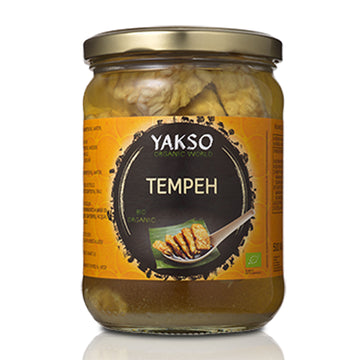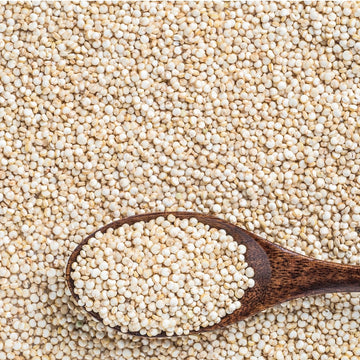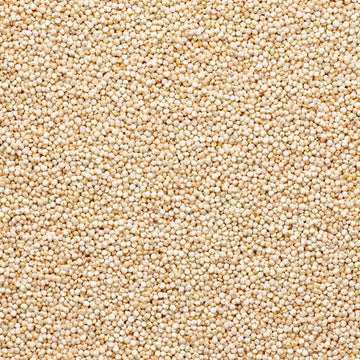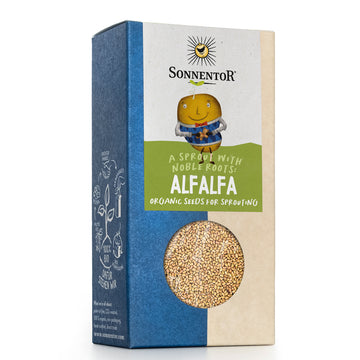A lot of women dread ‘the change’ as menopause is often referred to. With it often come a host of unpleasant symptoms from mood swings and hot flushes to night sweats and weight gain. But the likes of diet can help you manage symptoms. Here, we take a look at diet and menopause - the best foods to eat to help you during this transition.
What is Menopause?
The menopause is part of the natural ageing process and occurs when a woman’s ovaries gradually stop producing eggs, periods become irregular and eventually cease for good. As we age, our sex hormones change and re-balance the production of oestrogen. Oestrogen is the hormone that regulates our ovaries and periods. It gradually decreases and our ovaries fail to produce an egg each month. It is this slow decline in oestrogen levels that can cause the physical and psychological symptoms associated with the menopause.
However there is another sex hormone that works in partnership with oestrogen that drops to almost zero at menopause with the cessation of ovulation, this hormone is Progesterone. It is this decline in progesterone that can really heighten the various symptoms that occur during menopause. Symptoms of the menopause will vary from woman to woman but the main symptoms can include:
- hot flushes
- night sweats
- vaginal dryness
- mood swings
- declining libido
- osteoporosis
- ageing skin
- lack of energy
- joint pains
- weight gain
- headaches
- changes in hair quality
Diet and Menopause
So you may have enough oestrogen in your system but you also need its partner hormone progesterone, to re-balance the body and bring it back to optimal health.
As a Nutritional Therapist I always look at food first - what foods can have a positive effect on reducing or maintaining oestrogen levels while also bring up and balancing progesterone level? How can the food you eat alleviate menopausal symptoms? Here, we take a look at diet and menopause - which foods and vitamins can help with symptoms.
Omega 3 & B Vitamins
We are all susceptible to mood swings and low energy from time to time. But during menopause these swings can seem worse and more difficult to handle. Many women report increased feelings of low mood, lack of energy and anxiety during menopause. Low levels of B vitamins and omega-3s may exacerbate these mood swings.
Vitamin B rich foods
Whole, unprocessed foods like lean meat and poultry, liver, whole grains and lentils are all rich in B vitamins. Even by increasing B vitamin rich foods you may find it more beneficial to supplement with a high strength B Complex at first and then maintain levels through food.
Omega-3 rich foods
Up your intake by working oily fish (salmon, tuna, sardines), flaxseed, chia and hemp and/or the oils of these seeds into your diet daily. Alternatively you can look at taking a good quality Omega 3 Fish Oil Supplement.
Fibre
Gaining weight during and after menopause can increase your risk for heart disease and some forms of cancer. Fortunately increasing fibre-rich foods in the diet can help us feel fuller for longer and maintain a healthy weight. Also fibre can help us balance hormonal levels. Fibre will bind on to used and unwanted hormones and remove them from the body through regular bowel movements. Aim to eat between 25 and 35 grams of fibre each day. The best sources of fibre are:
- whole grains like quinoa
- barley
- lentils
- fruits for example apples and raspberries
- veggies such as spinach
Phytoestrogens
Phytoestrogens taken in to the body though plants, function much like animal oestrogen in humans. When we eat phytoestrogens they mimic our endogenous oestrogen. They are much weaker so our bodies may respond as if real oestrogen were present. This is important when looking to use food to alleviate menopausal symptoms.
Plant based oestrogens may offer benefits to menopausal or postmenopausal women by a reduction in bone loss, leading to higher bone density and fewer breaks, when given alongside vitamin D3. Health benefits attributed to a diet rich in phytoestrogens include; relief from menopausal symptoms, lowered risk of heart disease and breast cancer. Phytoestrogens exert their beneficial effects through several mechanisms that slow cell growth and prevent inflammation. Foods high in Phytoestrogens include:
- tempeh
- flaxseeds/linseeds (milled and whole)
- oats
- barley
- lentils
- sesame seeds
- broccoli
- sweet potatoes
- alfalfa
- apples
- carrots
- pomegranates
- wheat germ
Herbal Helpers
Agnus Castus (Vitex Agnus Castus)
This herb is classed as an adaptogen as it has a balancing effect on your hormones. It works on the pituitary gland which is the gland that sends the message down to the ovary to release hormones. Agnus Castus can help increase certain hormones, like progesterone. This is particularly helpful in the perimenopause years because your hormones can be fluctuating widely. This herb helps to create a kind of stability. It's also the best herb to take if you are getting mood swings, anxiety and tension.
Milk Thistle (Silymarin Marianum)
Again in any situation where you are aiming to balance the female hormones, it is so important to add in herbs which can improve liver function like Milk Thistle. It is your liver that is doing the hard work of detoxifying your hormones so you want to make the job as easy as possible.
Looking to read more about menopause and natural remedies you can try? Have a look at our article on The Stages of Menopause.
Please note, this blog is for informational purposes only and should not replace medical advice.
It’s always best to consult your doctor before taking any new supplements, treatments or remedies if you are pregnant, breastfeeding or on medication.
References
http://www.eatingwell.com/article/17336/foods-to-help-manage-menopause/
https://www.ncbi.nlm.nih.gov/pubmed/26410950
https://www.ncbi.nlm.nih.gov/pubmed/26546695
https://www.healthline.com/health/phytoestrogens#risks-and-side-effects3
https://www.nwhn.org/herbs-and-phytoestrogens/
https://www.marilynglenville.com/womens-health-issues/menopause/


















